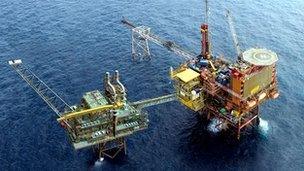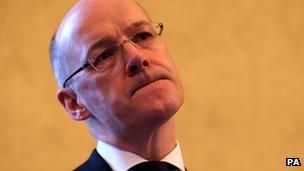Scottish independence: SNP's Swinney admits to economic challenges
- Published

The draft paper found a high level of volatility in projected revenues from North Sea oil
Scotland's finance secretary admitted there would be economic challenges in an independent Scotland but claimed it would be better placed to handle them.
John Swinney was responding to the contents of a draft government discussion document on the country's financial position after independence.
The year-old paper said the volatility in projecting North Sea oil revenues created financial uncertainty.
It said an oil fund could increase stability but might mean spending cuts.
Mr Swinney said the challenges ahead were not unusual.
He explained: "There would be economic challenges as there would be in any constitutional situation.
"We are wrestling with economic and financial challenges today as part of the UK and most other countries are wrestling with these factors and of course an independent Scotland would have to operate sustainable public finances and invest in the economy.
John Swinney: "We would start to invest in an oil fund at a moment when we could see the opportunity within the management of the public finances - not a commitment I can give today."
"These issues would have to be managed by an independent Scotland and they would be managed much more effectively by an independent Scotland then the are by the UK."
The Scottish government said the discussion paper had largely been overtaken by events.
It set out challenges, risks and opportunities that ministers believe Scotland would have in the event of a "yes" vote in the referendum.
It provides an insight into government thinking in the period following last spring's UK budget.
The paper recorded a high level of volatility in projected revenues from North Sea oil and said this created considerable uncertainty in financial planning.
It pointed out that revenues could also be higher than expected and that independence would give Holyrood greater power to manage its money.

John Swinney said the challenges ahead were not unusual
Mr Swinney said: "Certainly in an independent Scotland, a larger proportion of its public finances would relate to the revenues coming from oil and gas, but not as much as Norway, for example."
The paper suggested accumulating cash in an oil fund would help provide stability but says this could lead to reduced public spending.
The SNP has said it would like to see an oil fund set up in the event of independence to provide a revenue stream for future generations of Scots.
On that issue, the finance minister said: "We would start to invest in an oil fund at a moment when we could see the opportunity within the management of the public finances - not a commitment I can give today."
He added that the Scottish government was engaging in a "dispassionate approach" to the way it was informing the people of Scotland about how an independence might be.
'Sums don't add up'
Scottish Liberal Democrat leader Willie Rennie said the "buried document blows a crater" in the SNP's independence spending promises.
He added: "Publicly, the SNP talk about protecting the public sector after independence but behind closed doors they concede that public sector job cuts could be necessary to keep costs down.
"Even setting up something as fundamental as a tax collection system for an independent Scotland could cost us twice as much as Scotland's share of HMRC costs as part of the UK.
"The sums don't add up."
Scottish Labour leader Johann Lamont insisted Mr Swinney was in denial over civil servant advice about the dangers of basing the plans on a "volatile and diminishing commodity like North Sea oil".
She added: "They are telling him of an even deeper public spending crisis coming after the referendum. They are telling him of the problem of an ageing population.
"Yet when I raise these issues the SNP deny there is a deeper crisis coming. That's not what his own officials are telling him."